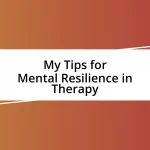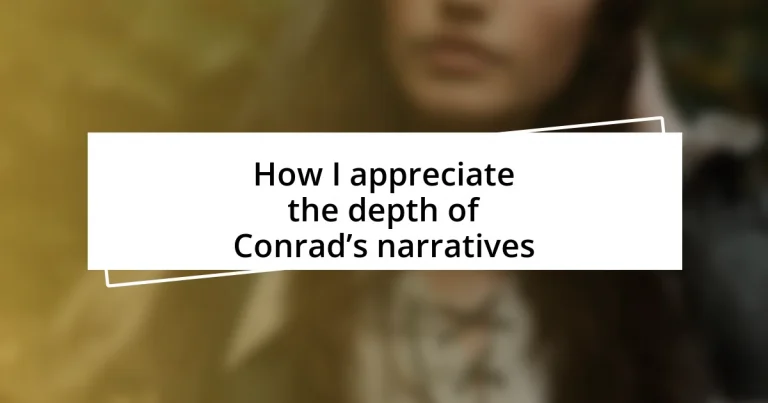Key takeaways:
- Conrad’s narrative style features unreliable narrators and vivid imagery, prompting readers to question morality and reflect on their own lives.
- Key themes in his works include human psychology, colonialism, and the conflict between civilization and savagery, resonating with contemporary issues.
- Conrad’s introspective storytelling contrasts with contemporaries, emphasizing existential dilemmas and the complexities of truth, urging personal reflection and moral contemplation.
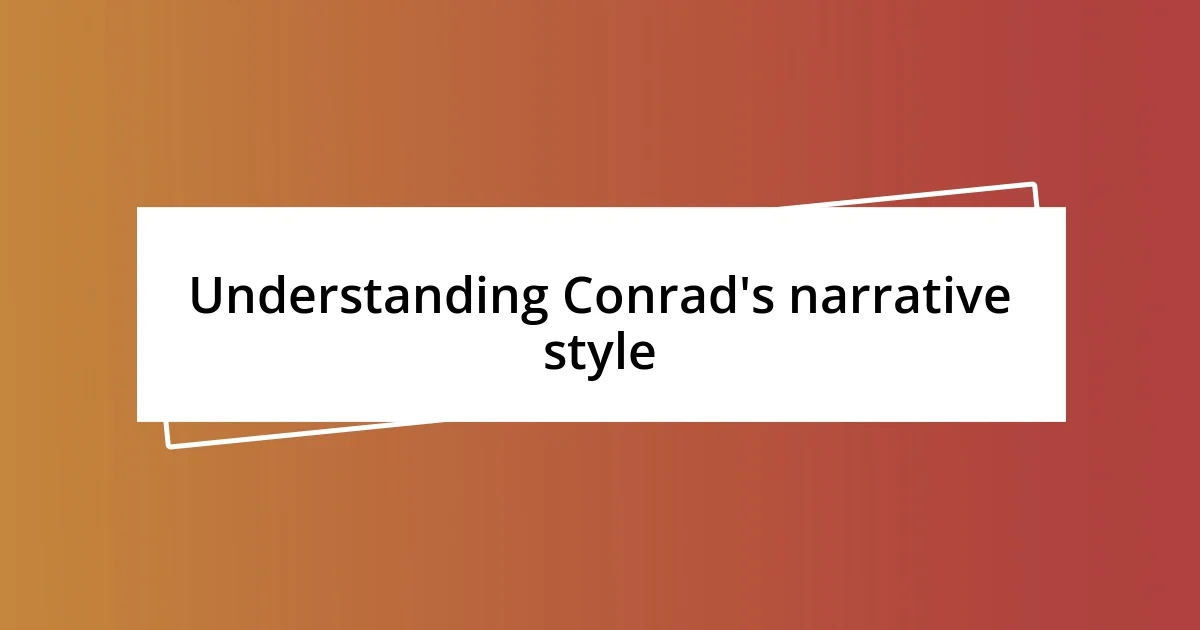
Understanding Conrad’s narrative style
Conrad’s narrative style is characterized by its intricate layers, often revealing the complexities of human experience. I remember the first time I encountered “Heart of Darkness”; the way he unraveled the story felt like peeling an onion, unveiling the grief and ambiguity behind every layer. Have you ever noticed how every character seems to mirror some facet of our own struggles or desires?
What stands out in Conrad’s work is his use of unreliable narrators, which creates a sense of tension and invites readers to question the truth. When I reflect on “Lord Jim,” I find myself grappling with Jim’s idealism and ultimate failure. It’s as if Conrad is asking us to consider: How do we define courage in a world fraught with moral dilemmas?
Additionally, Conrad’s mastery lies in his vivid imagery and atmospheric settings that evoke a deep emotional response. Reading “Nostromo,” I was struck by how he paints the landscape, making it feel alive—almost a character in itself. Isn’t it fascinating how a well-crafted setting can pull us deeper into the narrative, urging us to confront our own beliefs and biases?
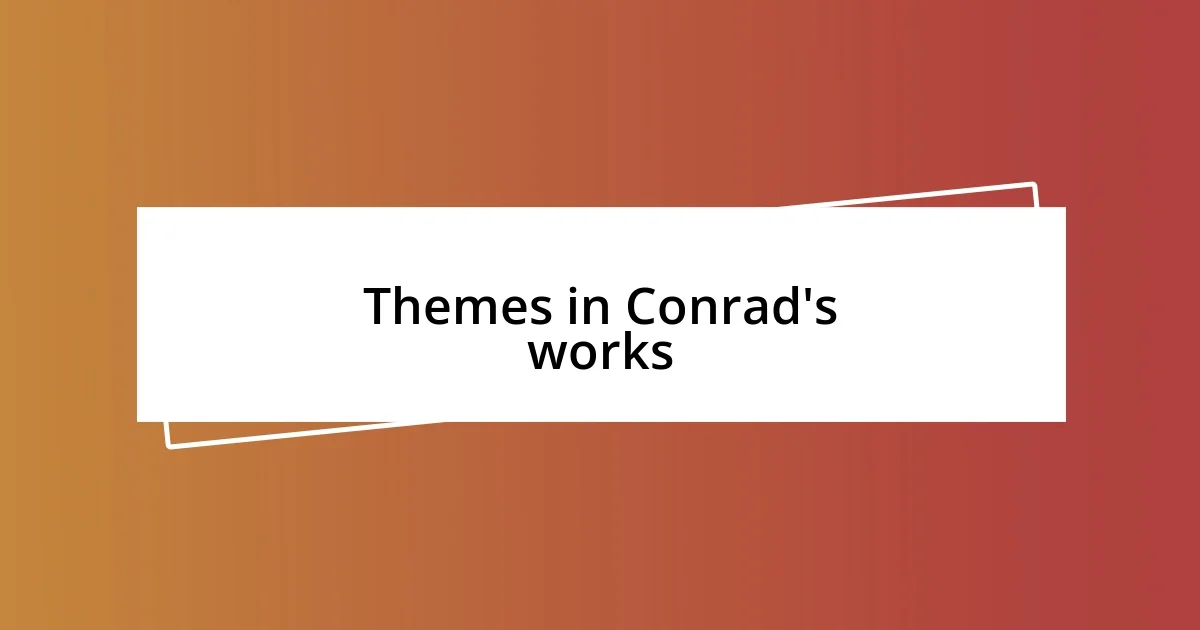
Themes in Conrad’s works
The themes in Conrad’s works are profoundly intertwined with human psychology and existential exploration. Take “Heart of Darkness,” for instance. The way it delves into the darkness of the human soul had me reflecting on my own moral compass. It’s almost as if Conrad invites us all to confront our inner shadows—what do we find there?
Another prominent theme is colonialism and its repercussions. In “Nostromo,” I found myself grappling with the exploitation of South America, and I couldn’t help but relate it to modern-day practices. Isn’t it striking how some of the issues Conrad tackled remain very much alive today? This connection extends beyond the page, pushing us to critique societal structures actively.
Lastly, the conflict between civilization and savagery echoes strongly in Conrad’s narratives. “Lord Jim” illustrates this beautifully. I often ponder Jim’s journey and how it reflects our struggles between societal expectations and personal integrity. Can a single misstep define us? Conrad masterfully questions this, urging us to rethink how we perceive failure and redemption.
| Theme | Description |
|---|---|
| Human Psychology | Explores the complexities of human nature and moral dilemmas. |
| Colonialism | Critiques the effects of imperialism on both the colonizer and the colonized. |
| Civilization vs. Savagery | Questions the boundaries between societal norms and personal integrity. |
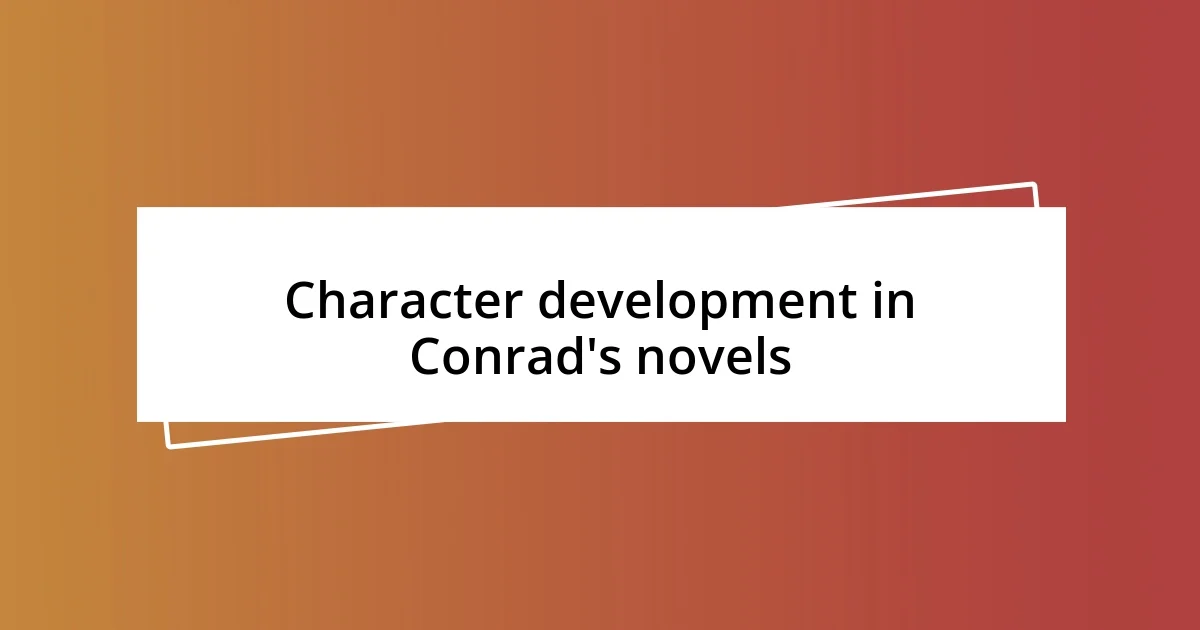
Character development in Conrad’s novels
Conrad’s character development is a tapestry of intricate motivations and psychological undercurrents. When I think about characters like Marlow from “Heart of Darkness,” I connect with his internal struggles—a man caught between the expectations of society and the haunting truths he uncovers. It’s as if I can feel his disillusionment seeping through the pages, forcing me to question my own values in the face of moral ambiguity. Each character feels like a mirror, reflecting the complexities within myself.
- Characters often embody dualities, such as idealism versus reality.
- Their journeys lead to profound personal transformation, revealing deeper truths.
- The relationships between characters highlight Conrad’s focus on social and moral conflicts.
In “Lord Jim,” Jim’s quest for redemption resonates with my own experiences of grappling with mistakes and striving for meaning. I remember a time when I had to confront my own failure in a significant project, much like Jim. It made me understand the weight of a single decision and its ripple effects on one’s identity. Conrad challenges us to examine whether our past defines us or if we can transcend our errors, ultimately crafting compelling narratives that resonate deeply with our human experience.
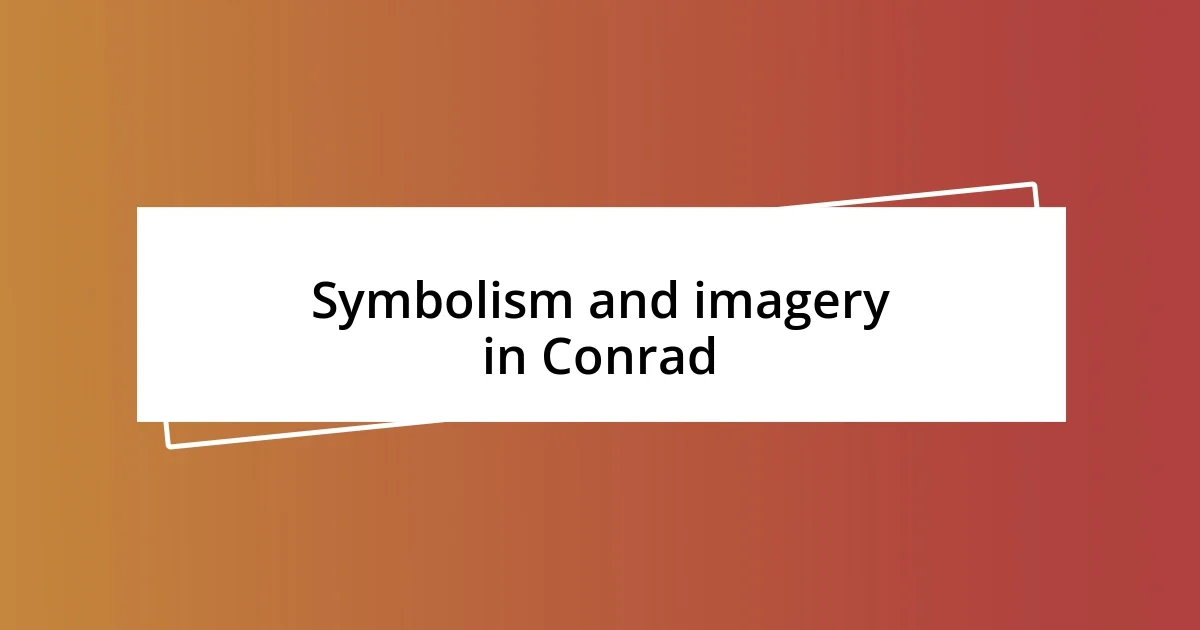
Symbolism and imagery in Conrad
Conrad’s use of symbolism and imagery is not just artistic; it’s deeply evocative. Take “Heart of Darkness,” where the river acts as a symbol of both a physical journey and an introspective exploration of the self. When I first encountered the river, I felt as though it mirrored my own life path—often turbulent, sometimes murky. Isn’t it fascinating how a simple image can prompt such profound reflections?
In “Nostromo,” the silver mine represents not only wealth but the moral decay brought by greed and imperialism. I found myself pondering the heavy cost of ambition—what are we willing to sacrifice for success? This imagery struck a chord with me, reminding me of times I’ve chased goals at the expense of my own ethics or well-being.
Moreover, the fog in Conrad’s narratives often symbolizes confusion and moral ambiguity. I vividly recall feeling lost while navigating tough decisions in my life, similar to how Marlow feels enveloped in uncertainty. It raises the question: Can clarity emerge from the fog of indecision, or does it only deepen our inner struggles? To me, Conrad’s imagery compels us to confront these dilemmas, urging us to search for meaning amid chaos.
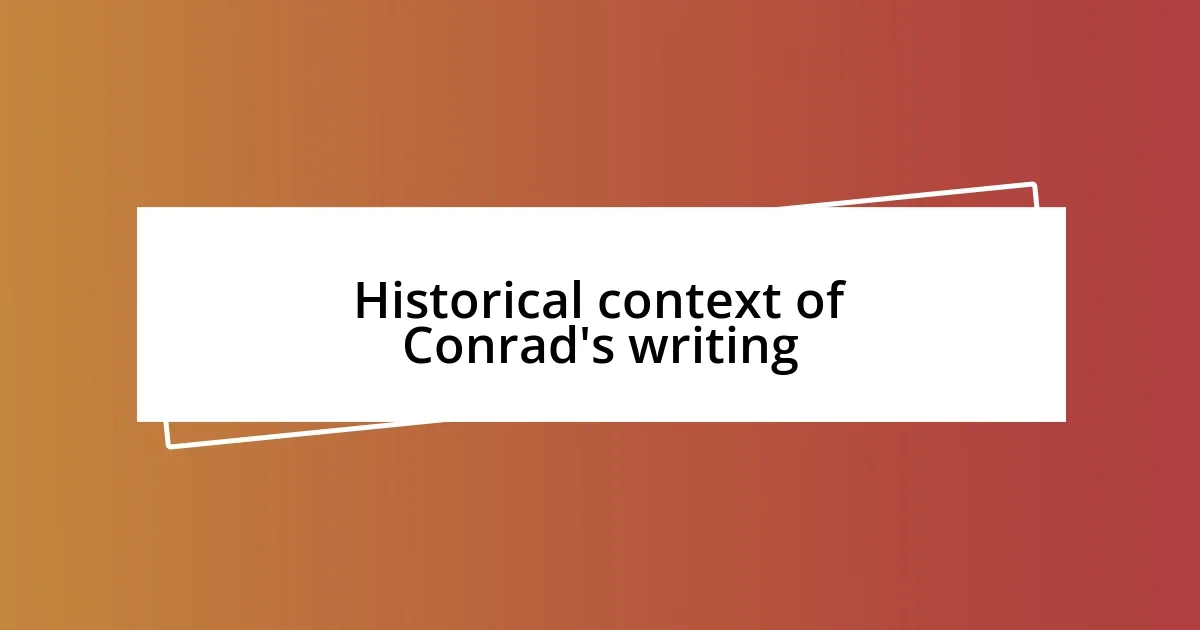
Historical context of Conrad’s writing
The historical context of Joseph Conrad’s writing is intertwined with the late 19th-century European imperialism. This era was marked by rapid colonization and exploitation, shaping not only global politics but also individual identities. When I delve into his works, I can’t help but feel the weight of this period pressing down, as characters grapple with the moral implications of their actions within this colonial backdrop. How does one’s conscience navigate the murky waters of conquest?
Conrad himself was a Polish immigrant who experienced firsthand the cultural tensions and political upheavals of Europe. This background deeply influenced his narrative style and thematic focus. I often reflect on how my own experiences of relocation and identity shape my perspective. Have you ever felt out of place? Conrad’s characters often mirror this struggle, portraying the isolation and existential questions that arise from feeling caught between cultures or worlds.
The era’s technological advancements, such as steamships and telegraphs, also play a significant role in his narratives, symbolizing the paradox of progress. On one hand, these tools represented humanity’s stride towards modernity; on the other, they exposed the darkness within human nature. I remember feeling a surge of excitement when I first understood this duality in his work—how technology can both connect and alienate us. Don’t you sometimes find yourself torn between the marvels of innovation and the ethical dilemmas it spawns? Conrad captures this tension beautifully, making his narratives resonate beyond their historical context.
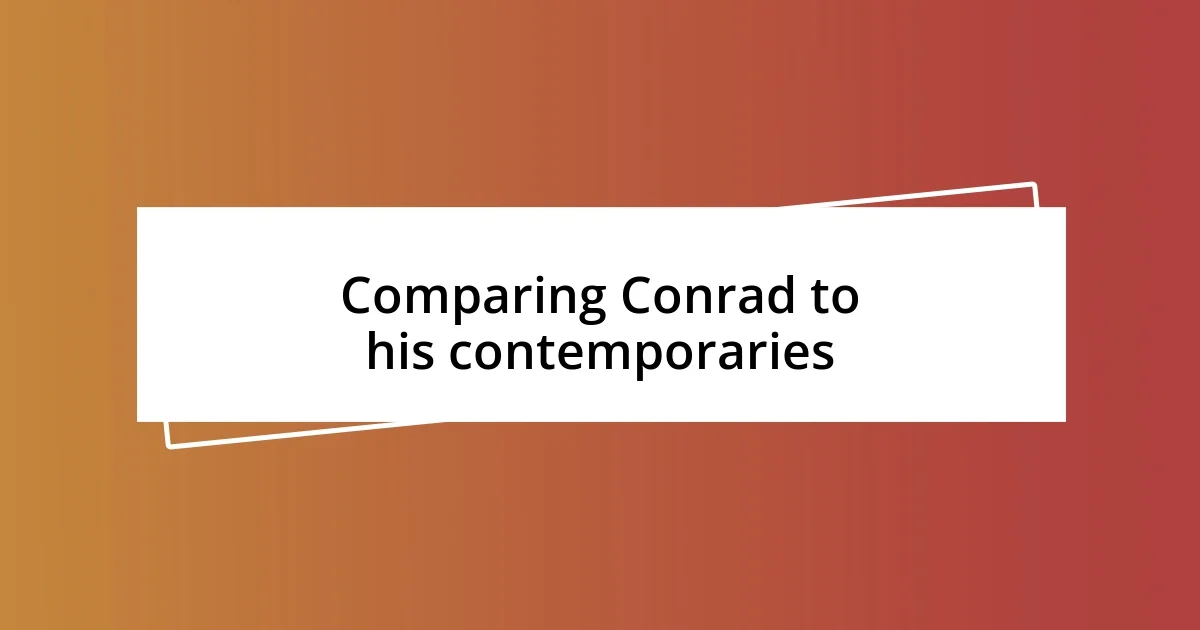
Comparing Conrad to his contemporaries
Conrad’s approach to storytelling often feels more introspective compared to his contemporaries like Henry James and H.G. Wells. While James intricately explored the psychological nuances of his characters, I find Conrad’s narratives lean heavily on existential dilemmas, prompting readers to question their own moral compass. When I read “Heart of Darkness,” I felt as if I were dragged into a philosophical debate, something I didn’t always experience with James, who seemed more concerned with the intricacies of social interactions.
In contrast, Wells embraced technological advancements in his works, often celebrating progress. But Conrad, with his haunting critiques of imperialism, makes us confront the darker implications of such progress. I remember feeling a jarring conflict within myself while reading “Nostromo,” where the allure of wealth simultaneously sickened me. Doesn’t it give you pause to think about what we might overlook in our quest for advancement? I can’t help but admire how Conrad forces us into these uncomfortable reflections, setting him apart from his contemporaries.
Furthermore, when I analyze Conrad’s use of unreliable narrators, I see a striking difference from authors like Mark Twain, who uses humor and satire to clarify his points. Conrad, however, uses this technique to deepen the ambiguity of his narratives. I found myself questioning what was real and what was merely perception. It’s a gripping experience when you realize that the truth may be shrouded in layers of personal bias—isn’t that a relatable struggle we all face in interpreting our own lives? Conrad’s narratives, in this light, challenge me to reevaluate not just literature but my understanding of truth itself.
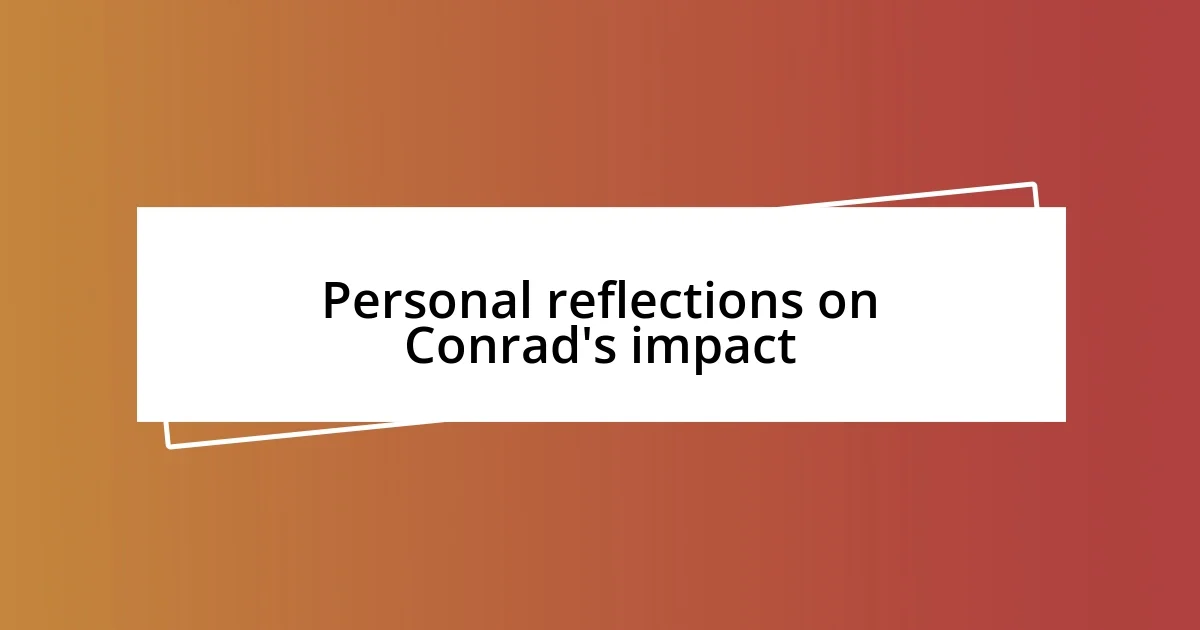
Personal reflections on Conrad’s impact
There’s something profoundly moving about reading Conrad’s work that stays with me long after I’ve closed the book. I recall poring over “Lord Jim,” feeling an unexpected kinship with Jim’s quest for redemption. In those moments, I couldn’t help but wonder: how often do we seek to atone for our past misjudgments, even when the path seems fraught with uncertainty? It’s almost as if Conrad’s narratives serve as a mirror, reflecting my own struggles and the universal desire for grace.
I often find myself reflecting on the complexity of human nature that Conrad captures so vividly. For instance, when I encountered the theme of duality in “The Secret Agent,” it resonated deeply within me. I remember a time when I felt torn between pursuing my ambitions and maintaining my integrity. It made me realize that, just as characters in Conrad’s stories wrestle with moral ambiguity, so too do we navigate our own ethical landscapes daily. Doesn’t that realization make you pause to consider the moral choices you face?
There’s an undeniable weight to Conrad’s impact—his ability to evoke conflicting emotions is remarkable. Every time I revisit “Heart of Darkness,” I am struck by a sense of unease, making me reflect on the darker aspects of human nature and our collective history. I can’t help but ask myself: how do we reconcile our fascination with adventure and discovery with the moral responsibilities that accompany it? That tension is profound, and it drives me to engage more sincerely with the world around me, reminding me of the complexities woven through our shared human experience.


